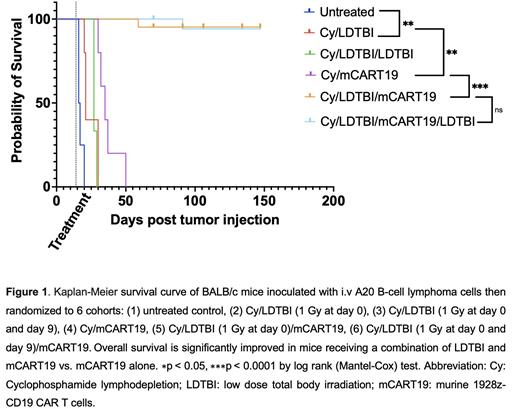Anti-CD19 chimeric antigen receptor T-cell (CART19) is associated with high response rates in large B-cell lymphoma (LBCL). However, a significant subset of patients relapses due to several mechanisms that include poor expansion, lack of CART19 persistence, and immunosuppressive tumor microenvironment. We hypothesized that low dose total body irradiation (LDTBI) may interfere with these mechanisms and thus enhance the efficacy of CART19 cells in LBCL.
To test this hypothesis, we utilized a syngeneic mouse model of LBCL, as they are immunocompetent, to best emulate patients treated in clinic. This model involves transplanting BALB/c mice with GFP/Luciferase transduced mouse derived B cell lymphoma (A20) cells and generating murine CART19 (mCART19). We tested mCART19 cytotoxicity in vitro against A20 cells with or without radiation. We found that exposing A20 cells to 1 Gy radiation prior to co-culturing them with mCART19 led to a significant improvement of the mCART19 cytotoxicity (E:T ratio 2.5:1; p=0.029). This is consistent with our in vitro findings for human LBCL cell lines, where weobserved that exposing LBCL cell lines to 1 Gy radiation significantly improved human CART19 cytotoxicity (E:T ratio 2.5:1: OCI-Ly10 cells: p=0.009; SU-DHL-4 cells: p=0.048).
Next, we assessed the activity of mCART19 cells in vivo. Animals were lymphodepleted using cyclophosphamide (Cy) administered 24 hours before mCART19 treatment. LDTBI at 1 Gy was delivered 4 hours before mCART19 administration. In addition to evaluating the benefit of single LDTBI prior to mCART19, we also delivered a second dose of LDTBI 9 days after mCART19 treatment. Thus, we evaluated 6 cohorts as follows: (1) Untreated n=4, (2) Cy/LDTBI n=5 (3) Cy/LDTBI/LDTBI n=3, (4) Cy/mCART19 n=5, (5) Cy/LDTBI/mCART19 n=5, (6) Cy/LDTBI/mCART19/LDTBI n=5. Adding LDTBI to Cy provided a minor improvement compared to untreated controls (median overall survival [OS]= 21 days vs 16.5 days; p=0.009). As expected, Cy/mCART19 improved median OS compared to controls (median OS= 35 day; p=0.003). Strikingly, 8/10 of the mice treated with Cy/LDTBI/mCART19 remained in complete remission (CR) at 6 months post-treatment ( p<0.001), Figure 1. Since one dose of LDTBI prior to mCART19 was very effective, adding the second dose of LDTBI did not result in additional survival benefit.
Peripheral blood (PB) was monitored regularly, we observed a 2.8-fold increase of mCART19 expansion in the Cy/LDTBI/mCART19 cohort when compared with the Cy/mCART19 cohort ( p<0.001) 9 days post treatment. Importantly, bone marrow aspirates were performed 6 months post treatment in animals that remained alive, demonstrating sustained B-cell aplasia in 7/8 mice (Cy/LDTBI/mCART19 cohorts) which strongly suggests mCART19 persistence. One animal showed B-cell recovery but remained in CR with no relapse suggesting potential cure. Mice that received Cy/mCART19 with no LDTBI showed evidence of B-cell reappearance 7 days prior to overt relapse.
Next, we assessed mCART19 trafficking into the tumor tissues by establishing new cohorts of (1) Cy/mCART19 n=4, (2) Cy/LDTBI/ mCART19 n=4 and harvesting tumor-infiltrated spleen and liver 3 days post treatment. Flow cytometry revealed that LDTBI cohort had significant increase in the amount of mCART19 in the spleen and the liver (3.15-fold; p=0.041, and 2-fold; p=0.012, respectively) compared to Cy/mCART19 cohort, suggesting that LDTBI improves mCART19 tumor-trafficking ability.
We have previously reported that exposing human LBCL cells to 1Gy radiation in vitro increases expression of FAS when compared to non-irradiated controls and that FAS blockade impairs CART19 cytotoxicity. Hence, we evaluated the expression of FAS in murine LBCL A20 cells harvested from the syngeneic mouse model 3 days post LDTBI. Consistently, we observed 3.1-fold increase in FAS expression, ( p=0.033).
In conclusion, our results show a novel and efficacious approach to harnessing LDTBI with CART19. Based on our findings, LDTBI enhances the efficacy of CART19 leading to improved survival in a syngeneic mouse model. Mechanistically, radiation improves CART19 efficacy by boosting CART19 expansion, persistence, trafficking into tumor sites, and upregulation of FAS in tumor cells, pointing to a clinically translatable benefit.
Disclosures
Brentjens:R.J.B. has licensed intellectual property to and collect royalties from BMS, Caribou and Sanofi. R.J.B. received research funding from BMS. R.J.B. is a consultant to BMS, Atara Biotherapeutics Inc, Coimmune, Triumvira and was a consultant for Gracell Bi: Consultancy, Current equity holder in publicly-traded company, Current holder of stock options in a privately-held company, Membership on an entity's Board of Directors or advisory committees, Patents & Royalties: BMS, Caribou and Sanofi, Research Funding. Van Besien:Actinium: Research Funding; BMS: Research Funding; Calibr: Research Funding; Avertix: Current equity holder in private company; Orca: Research Funding; Precision Biosciences: Research Funding; Intellia: Consultancy; Hemogenyx: Consultancy, Current equity holder in publicly-traded company; Moprhosys: Consultancy; SNIPR: Consultancy; Incyte: Consultancy.


This feature is available to Subscribers Only
Sign In or Create an Account Close Modal